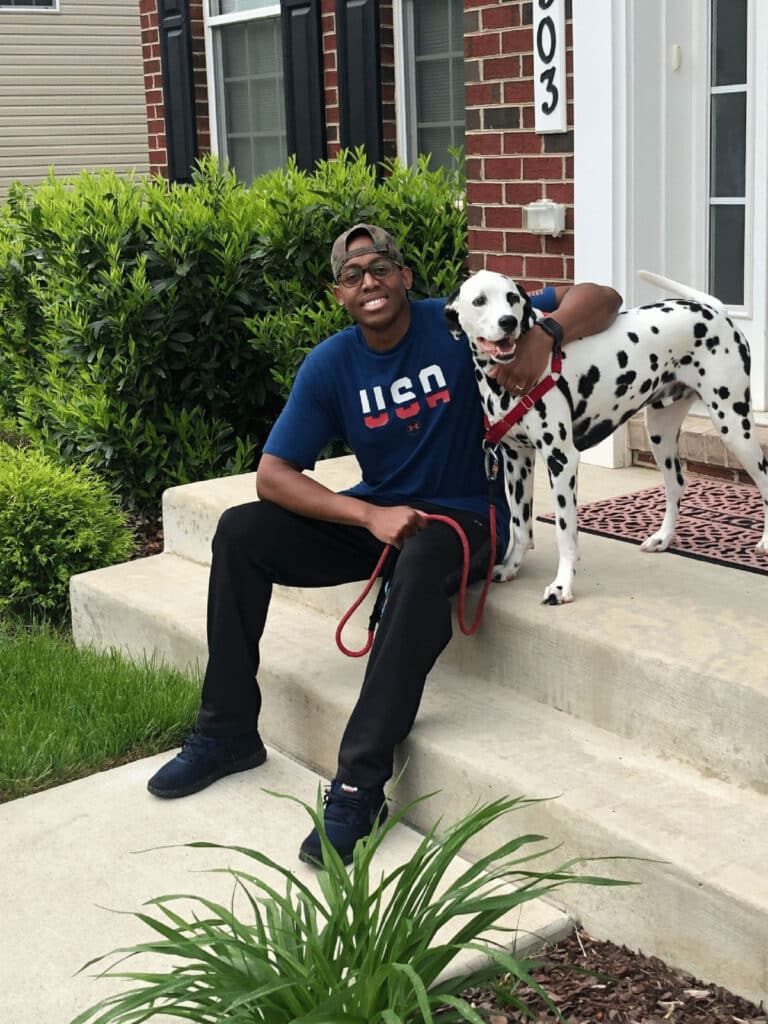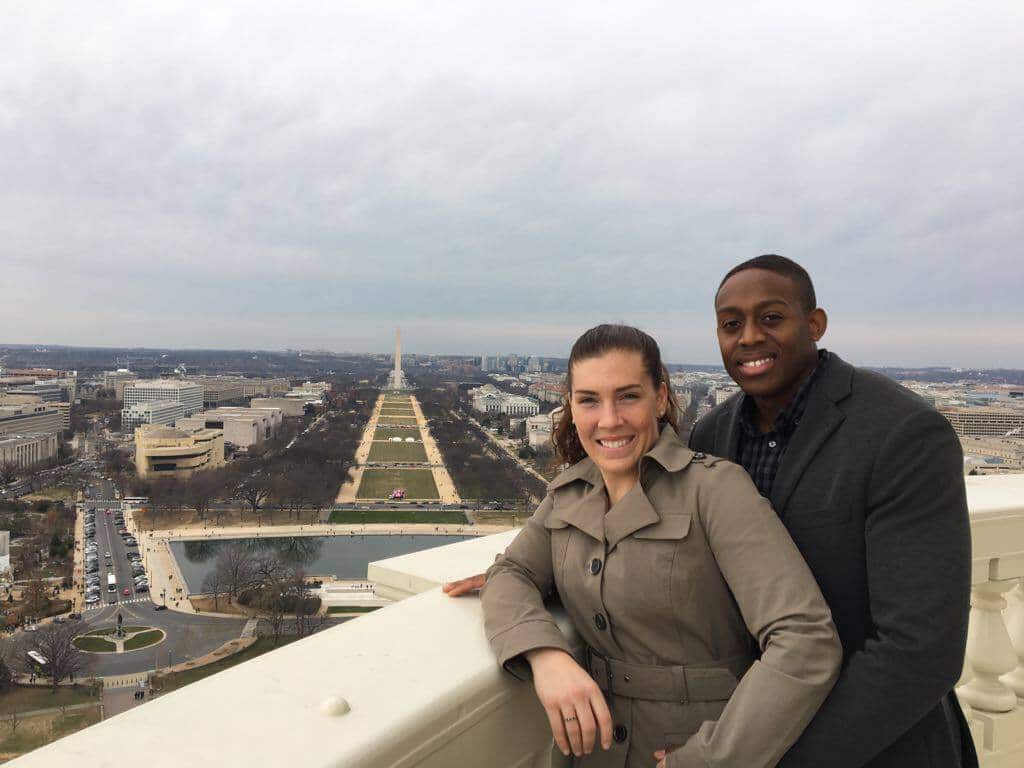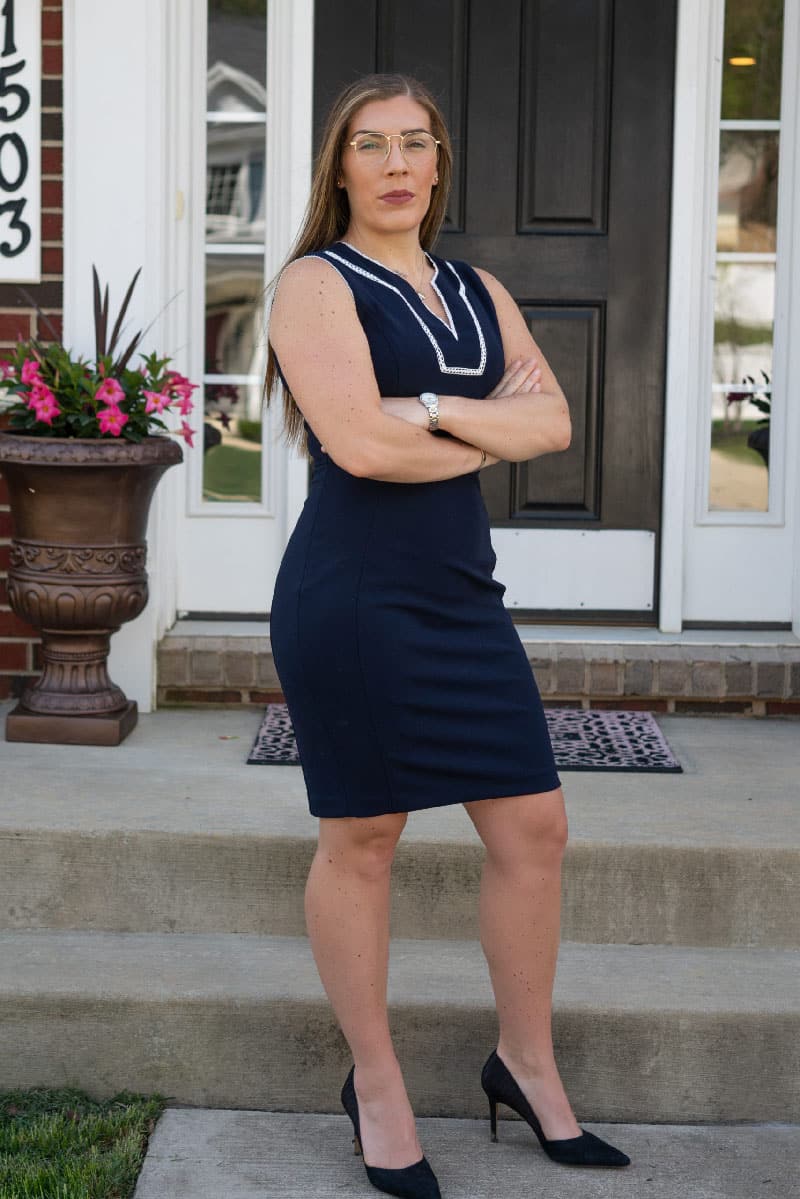
Chike Springer was many things — a husband, son, brother, uncle and patriot — but one thing he was known for most was his infectious positivity and determination. “Chike was hilarious — he did great impressions and made
jokes about everything, a lot of times about me or his mom,” his wife Lyndsay Springer recalls. “He was also very introspective and critical, but fair. He was the guy everyone wanted on their team because he made you better.”
He carried that positivity and determination with him in April 2019 after a series of tests, and a biopsy revealed he had T-cell histiocyte rich large B-cell lymphoma (THRLBCL), a rare and aggressive subtype of diffuse large B-cell lymphoma (DLBCL) with malignant B-cells and reactive T-lymphocytes. B-cells are lymphocytes that make antibodies to fight infections and are a vital part of the lymphatic system. T-cells stimulate B-cells to produce antibodies and kill cells that a foreign invader has already infected.
The most widely used treatment for DLBCL presently is the combination known as R-CHOP (rituximab [Rituxan], cyclophosphamide [Cytoxan], doxorubicin [Adriamycin], vincristine [Oncovin], and prednisone). The R-CHOP regimen is usually given in 21-day cycles (once every 21 days) for an average of six cycles. However, the length and number of cycles given can vary based on the patient’s disease and health status. In some instances, a patient is treated in 14-day cycles, and for limited-stage disease (Stage I or II), 3-4 cycles may be used, followed by radiation therapy.
Immediately, Chike began an alternate treatment for aggressive DLBCL called dose-adjusted EPOCH-R, which is a chemotherapy combination of etoposide phosphate, prednisone, vincrstine [Oncovin], cyclophosphamide, doxorubicin hydrochloride [hydroxydaunorubicin], and rituximab [Rituxan]. Typically during each treatment cycle, doses of some of the drugs may be increased or decreased to allow the patient the dose that works the best with the fewest side effects (dose-adjusted). By August of the same year, he showed a great response; however, his 8-week post-treatment PET scan showed continued signs of the disease. Furthermore, his lymph node biopsy showed the markers needed for more targeted therapy were no longer present in the cancer cells, precluding him from most of the novel therapies and clinical trials that were available at that time. Although chemotherapy was his only option, Chike remained positive and determined to continue. “He always believed he would make it through and always stayed positive,” says Lyndsay. “He looked for every opportunity to help any other cancer patients in the infusion room who he noticed were having a hard time by talking to them with his huge smile and offering whatever he could.”
“We wanted to be a support for organizations and help fill the gaps in care and research.”
During Chike’s treatment, he and Lyndsay became hyperfocused on learning about lymphoma, its treatment, and research. Given the rarity of Chike’s lymphoma, they immersed themselves in learning about the molecular differences in lymphoma and how advances in precision medicine can impact treatment for patients like him. They began to entertain the idea of forming a charitable foundation that supports innovative research and mentors middle and high schoolers who are interested in cancer research or biomedical science. “We didn’t want to compete with great organizations doing fantastic things for patients, the families, and the science,” says Lyndsay. “We wanted to be a support for organizations and help fill the gaps in care and research.”
Unfortunately, Chike’s health continued to decline, and he was admitted to the emergency room. The doctors did everything they could, but his body had been through too much. “Chike was the strongest person I have ever known. He did everything right and was always confident and positive,” says Lyndsay. “I know now that cancer has nothing to do with who you are or how hard you try to beat it. Cancer can happen to anyone, and only together we will overcome and beat it.” Lyndsay thought about when she and Chike were planning to form a foundation and decided to turn the plan into action and reached out to his family and friends for support. “It broke my heart to think that he would never get the chance to do this, but together, we will try to do that for him in his honor.”

With Lyndsay as President, Chike’s brother Adwin as Vice President and Treasurer, and a host of other family and friends, the Chike Springer Foundation was born. The foundation’s mission is to enable better treatment options and promote diversity in cancer research, and it focuses on two issues close to Lyndsay, Chike and their family: addressing the need for diversity and mentorship in cancer research and biomedical professionals and funding innovative research with the most significant impact.
As Lyndsay began searching for a nonprofit that aligned with her foundation’s vision and mission, she came across an article in the ASCO Post written by LRF Scientific Advisory Board (SAB) member Bruce Cheson, MD, FACP, FAAS, FAAAS, on progress made in the treatment of DLBCL. She decided to contact him. “I decided to take a chance and reached out to Dr. Cheson on LinkedIn — I was so surprised he responded!” she says. “I shared with him my background and mission of the foundation, and he began talking about the Lymphoma Research Foundation.” She was impressed by the Lymphoma Research Foundation’s (LRF) results-driven and comprehensive approach addressing key gaps in lymphoma research and patient care. “The more I spoke with staff at the Foundation, the more I got to witness their passion for finding cures for lymphoma,” she says.
 This year, the Chike Springer Foundation partnered with LRF to sponsor Luis Malpica Castillo, MD, an LRF Scholar (aka Chike Springer Legacy Scholar) in the 2021 Lymphoma Scientific Research Mentoring Program (LSRMP). The LSRMP is a first-of-its-kind two-year program that provides hematology and oncology fellows and junior faculty a unique experience to learn how to build a successful lymphoma research career. Program participants, known as LRF Scholars, attend a week-long intensive workshop to learn and network with members of LRF’s SAB and gain the skills needed to design and administer research studies, apply for future grant funding and establish themselves as independent researchers. Dr. Castillo’s LRF research project will evaluate the clinical, epidemiologic, host genetics and treatment factors that may influence patients’ outcomes in Latin America.
This year, the Chike Springer Foundation partnered with LRF to sponsor Luis Malpica Castillo, MD, an LRF Scholar (aka Chike Springer Legacy Scholar) in the 2021 Lymphoma Scientific Research Mentoring Program (LSRMP). The LSRMP is a first-of-its-kind two-year program that provides hematology and oncology fellows and junior faculty a unique experience to learn how to build a successful lymphoma research career. Program participants, known as LRF Scholars, attend a week-long intensive workshop to learn and network with members of LRF’s SAB and gain the skills needed to design and administer research studies, apply for future grant funding and establish themselves as independent researchers. Dr. Castillo’s LRF research project will evaluate the clinical, epidemiologic, host genetics and treatment factors that may influence patients’ outcomes in Latin America.
“We are extremely grateful for the incredible work of LRF and the support they have shown us,” she says. “I’m excited to see where we go and the impact we can make in the years to come. Together we overcome.”
For Lyndsay, she is hopeful about the impact Chike Springer Foundation can make in Chike’s honor. “We’ve done so much already within the first year, and that success is due to everyone who has been inspired by Chike’s story and supported us. We are extremely grateful for the incredible work of LRF and the support they have shown us,” she says. “I’m excited to see where we go and the impact we can make in the years to come. Together we overcome.”
 Read more articles and updates in the latest issue of Pulse
Read more articles and updates in the latest issue of Pulse
Pulse is a publication of the Lymphoma Research Foundation, providing the latest updates on the Foundation and its focus on lymphoma and chronic lymphocytic leukemia (CLL) research, awareness and education. Read more >
 Read more articles and updates in the latest issue of Pulse
Read more articles and updates in the latest issue of Pulse